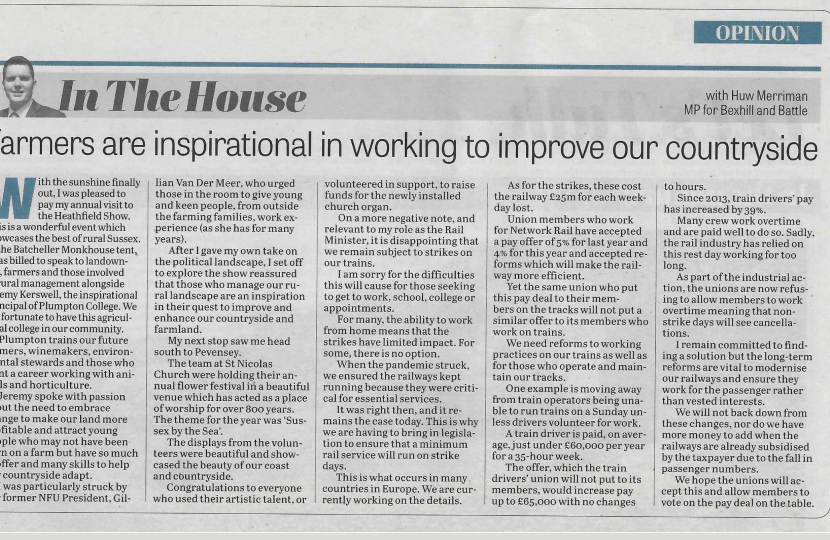
With the sunshine finally out, I was pleased to pay my annual visit to the Heathfield Show. This is a wonderful event which showcases the best of rural Sussex. In the Batcheller Monkhouse tent, I was billed to speak to landowners, farmers and those involved in rural management alongside Jeremy Kerswell, the inspirational Principal of Plumpton College. We are fortunate to have this agricultural college in our community. Plumpton trains our future farmers, winemakers, environmental stewards and those who want a career working with animals and horticulture. Jeremy spoke with passion about the need to embrace change to make our land more profitable and attract young people who may not have been born on a farm but have so much to offer and many skills to help our countryside adapt. I was particularly struck by our former NFU President, Gillian Van Der Meer, who urged those in the room to give young and keen people, from outside the farming families, work experience (as she has for many years). After I gave my own take on the political landscape, I set off to explore the show reassured that those who manage our rural landscape are an inspiration in their quest to improve and enhance our countryside and farmland.
My next stop saw me head south to Pevensey. The team at St Nicolas Church were holding their annual flower festival in a beautiful venue which has acted as a place of worship for over 800 years. The theme for the year was ‘Sussex by the Sea’. The displays from the volunteers were beautiful and showcased the beauty of our coast and countryside. Congratulations to everyone who used their artistic talent, or volunteered in support, to raise funds for the newly installed church organ.
On a more negative note, and relevant to my role as the Rail Minister, it is disappointing that we remain subject to strikes on our trains. I am sorry for the difficulties this will cause for those seeking to get to work, school, college or appointments. For many, the ability to work from home means that the strikes have limited impact. For some, there is no option. When the pandemic struck, we ensured the railways kept running because they were critical for essential services. It was right then, and it remains the case today. This is why we are having to bring in legislation to ensure that a minimum rail service will run on strike days. This is what occurs in many countries in Europe. We are currently working on the details.
As for the strikes, these cost the railway £25m for each weekday lost. Union members who work for Network Rail have accepted a pay offer of 5% for last year and 4% for this year and accepted reforms which will make the railway more efficient. Yet the same union who put this pay deal to their members on the tracks will not put a similar offer to its members who work on trains.
We need reforms to working practices on our trains as well as for those who operate and maintain our tracks. One example is moving away from train operators being unable to run trains on a Sunday unless drivers volunteer for work.
A train driver is paid, on average, just under £60,000 per year for a 35-hour week. The offer, which the train drivers’ union will not put to its members, would increase pay up to £65,000 with no changes to hours. Since 2013, train drivers’ pay has increased by 39%. Many crew work overtime and are paid well to do so. Sadly, the rail industry has relied on this rest day working for too long. As part of the industrial action, the unions are now refusing to allow members to work overtime meaning that non-strike days will see cancellations. I remain committed to finding a solution but the long-term reforms are vital to modernise our railways and ensure they work for the passenger rather than vested interests. We will not back down from these changes, nor do we have more money to add when the railways are already subsidised by the taxpayer due to the fall in passenger numbers. We hope the unions will accept this and allow members to vote on the pay deal on the table.



